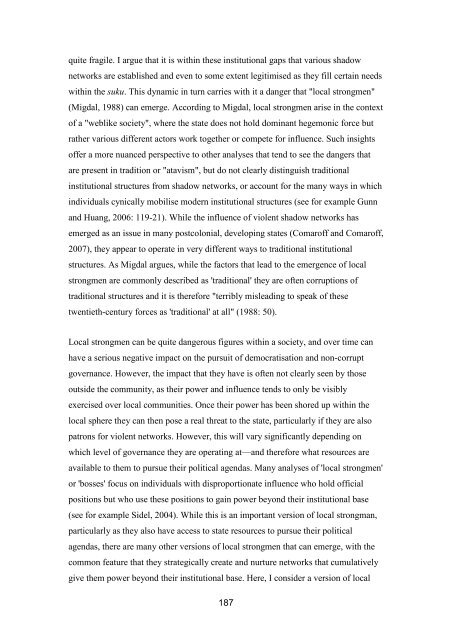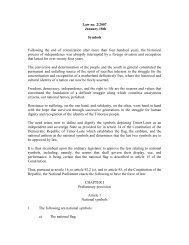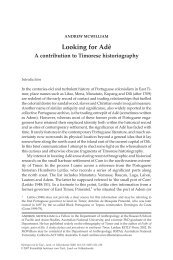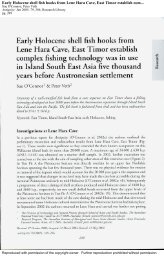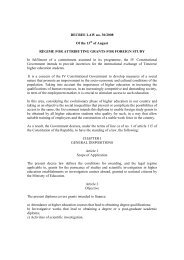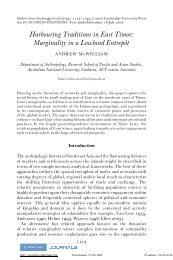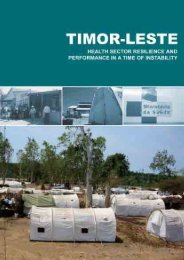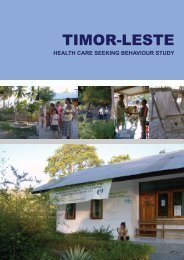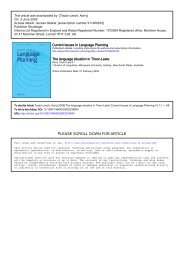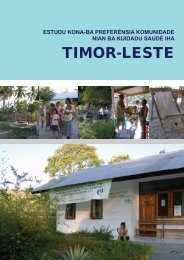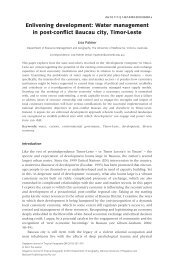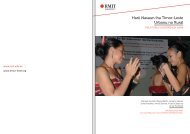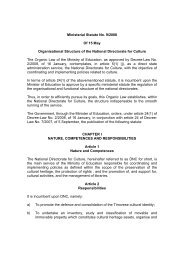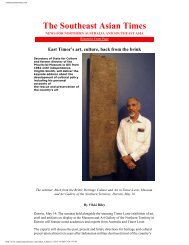Local Governance in Timor-Leste - Secretaria de Estado da Arte e ...
Local Governance in Timor-Leste - Secretaria de Estado da Arte e ...
Local Governance in Timor-Leste - Secretaria de Estado da Arte e ...
- No tags were found...
Create successful ePaper yourself
Turn your PDF publications into a flip-book with our unique Google optimized e-Paper software.
quite fragile. I argue that it is with<strong>in</strong> these <strong>in</strong>stitutional gaps that various shadownetworks are established and even to some extent legitimised as they fill certa<strong>in</strong> needswith<strong>in</strong> the suku. This dynamic <strong>in</strong> turn carries with it a <strong>da</strong>nger that "local strongmen"(Mig<strong>da</strong>l, 1988) can emerge. Accord<strong>in</strong>g to Mig<strong>da</strong>l, local strongmen arise <strong>in</strong> the contextof a "weblike society", where the state does not hold dom<strong>in</strong>ant hegemonic force butrather various different actors work together or compete for <strong>in</strong>fluence. Such <strong>in</strong>sightsoffer a more nuanced perspective to other analyses that tend to see the <strong>da</strong>ngers thatare present <strong>in</strong> tradition or "atavism", but do not clearly dist<strong>in</strong>guish traditional<strong>in</strong>stitutional structures from shadow networks, or account for the many ways <strong>in</strong> which<strong>in</strong>dividuals cynically mobilise mo<strong>de</strong>rn <strong>in</strong>stitutional structures (see for example Gunnand Huang, 2006: 119-21). While the <strong>in</strong>fluence of violent shadow networks hasemerged as an issue <strong>in</strong> many postcolonial, <strong>de</strong>velop<strong>in</strong>g states (Comaroff and Comaroff,2007), they appear to operate <strong>in</strong> very different ways to traditional <strong>in</strong>stitutionalstructures. As Mig<strong>da</strong>l argues, while the factors that lead to the emergence of localstrongmen are commonly <strong>de</strong>scribed as 'traditional' they are often corruptions oftraditional structures and it is therefore "terribly mislead<strong>in</strong>g to speak of thesetwentieth-century forces as 'traditional' at all" (1988: 50).<strong>Local</strong> strongmen can be quite <strong>da</strong>ngerous figures with<strong>in</strong> a society, and over time canhave a serious negative impact on the pursuit of <strong>de</strong>mocratisation and non-corruptgovernance. However, the impact that they have is often not clearly seen by thoseoutsi<strong>de</strong> the community, as their power and <strong>in</strong>fluence tends to only be visiblyexercised over local communities. Once their power has been shored up with<strong>in</strong> thelocal sphere they can then pose a real threat to the state, particularly if they are alsopatrons for violent networks. However, this will vary significantly <strong>de</strong>pend<strong>in</strong>g onwhich level of governance they are operat<strong>in</strong>g at—and therefore what resources areavailable to them to pursue their political agen<strong>da</strong>s. Many analyses of 'local strongmen'or 'bosses' focus on <strong>in</strong>dividuals with disproportionate <strong>in</strong>fluence who hold officialpositions but who use these positions to ga<strong>in</strong> power beyond their <strong>in</strong>stitutional base(see for example Si<strong>de</strong>l, 2004). While this is an important version of local strongman,particularly as they also have access to state resources to pursue their politicalagen<strong>da</strong>s, there are many other versions of local strongmen that can emerge, with thecommon feature that they strategically create and nurture networks that cumulativelygive them power beyond their <strong>in</strong>stitutional base. Here, I consi<strong>de</strong>r a version of local187


